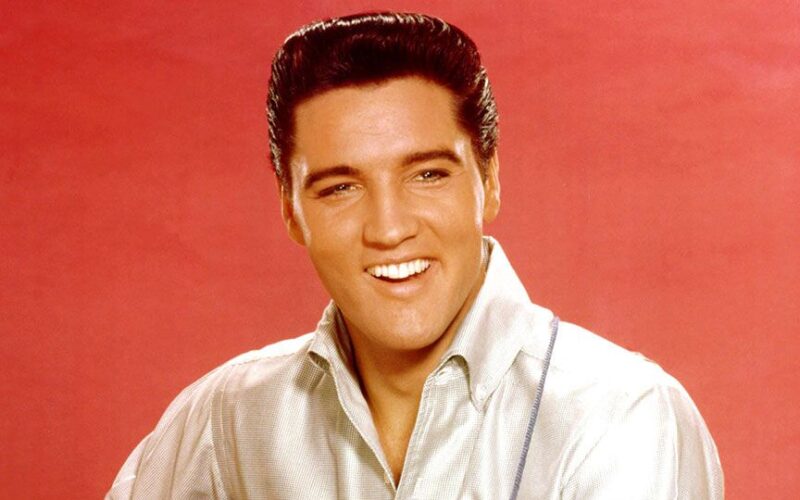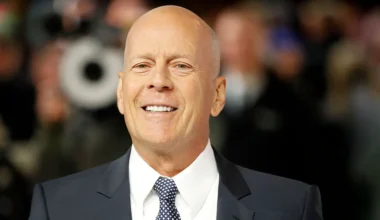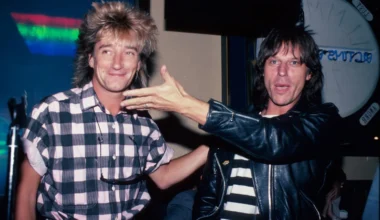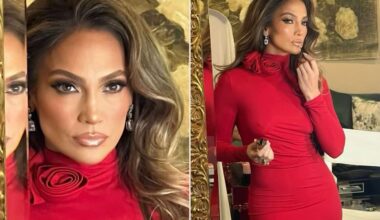Dolly Parton and Elvis Presley are two of the biggest names in the history of music. While Presley lives on in cultural memory as the King, Parton is considered an international treasure. However, the relationship between the figures was strained at best and outright unfriendly at worst.
In the final moments of Sofia Coppola’s most recent film, Priscilla, Parton’s heartbreak anthem ‘I Will Always Love You’ plays out. Based on Priscilla Presley’s autobiography, Elvis and Me, Coppola’s movie takes a stark look at the realities of the relationship between the couple, refusing to glorify the musician anymore. Coppola is daring to do what Baz Luhrmann wouldn’t, humanising Presley and addressing his flaws and bad behaviour. Showing the moment when Priscilla finally leaves the marriage, the significance of the Parton song has a personal and long history attached to it.
The story goes that Elvis Presley desperately wanted to record a cover of the 1974 hit. Presley, much like most 1950s and ‘60s singers, had a long history of recording cover versions. In the early days of rock and roll, it was the done thing. Much like the tradition of jazz standards, musicians would regularly cover the same hit singles, sharing their own take on it. Some of Elvis’ biggest hits were covers, including ‘Hound Dog’, ‘Always On My Mind’ and ‘Blue Suede Shoes’.
While most songwriters would let Presley add his shine to songs and cash in on the almost guaranteed hit, Parton was a different prospect. “I wouldn’t let Colonel Tom Parker [record the song],” Parton explained to the Los Angeles Times, detailing her dislike for Presley’s long-term manager.
“[T]he night before [the recording session], Colonel Tom Parker calls me and says, ‘Well, you know we don’t record anything with Elvis unless we have publishing on it, or at least half the publishing,’’ she continued. By this point, the song was already a hit for Parton. She earned the number one slot with it upon its release, so she knew how important keeping control of the song was. “Well, I said, because I had a No. 1 song on it, I said, ‘This is the most important copyright in my whole publishing company, and I can’t do that.’”
Parton has earned more than $10million in royalties from the song. It is without a doubt her most successful and lucrative hit, so she made the right call by not signing a portion of it away to Presley. But the decision wasn’t easy.
“I cried all night. I mean, it was like the worst thing. People were saying, ‘You’re nuts. It’s Elvis Presley. Hell, I’d give him all of it.’ I said, ‘I can’t,’” Parton said in a TV interview. She took the time to truly considered the decision and often reflected on what might have been, adding, “I always wondered what it would sound like. I know he would have killed it.” However, her call was the right one, as she stated, “Then when Whitney [Houston’s version] came out, I made enough money to buy Graceland.”
Unlike Presley’s history of covering the songs of Black artists and demanding credit for their work, Parton has a long history of incredible charity work and community outreach. In fact, Parton used the royalties earned from the cover to give back as she bought properties in a predominantly black neighbourhood of Nashville and supports families who live there with rent, college tuition and more.
However, Parton has recently revealed a new detail in the story. As it turns out, the country singer and Priscilla Presley have been friends for a while, with Presley sharing a personal connection to the song.
“In fact, I talked to Priscilla not very long ago. She said to me, ‘You know, Elvis sang that song to me when we walked down the courthouse steps when we got divorced. He was singing to me ‘I Will Always Love You.’” Parton recalled.
The song now provides a keen double-meaning for two icons of the 20th century. For Parton, the tune remains a shining beacon of why keeping hold of control is vitally important. Yet, for Priscilla Presley, ‘I Will Always Love You’ is an anthem for escaping the clutches of another. Sofia Coppola knew it was the perfect track to soundtrack the finale moment of her film.
Of the film, Coppola told Vogue, “I knew I wanted it to end with her leaving the gates of Graceland—that image of her driving off to find herself and start a new life was always the final frame.” However, the song to soundtrack that moment was of vital importance. That’s where Dolly Parton came in and saved the day.
Despite not letting Presley use the song, Parton granted permission for the track to be used to tell Priscilla’s story in an act of solidarity. Coppola added, “I knew early on in the script that we had to have that song at the end, and I was so happy that Dolly let us use it because I don’t know what we would’ve used in its place.”
“That song is filled with so much pain and love and heartache, and it expresses exactly what Priscilla felt at that moment in time. She knew it was time to move on despite this well of emotion she still had for Elvis,” she continued.
As a film centring Priscila Presley’s experience and finally telling her story, carving out space for a woman’s voice amidst the glorifying and male-dominated retellings of Elvis’ career, ending with the song felt like a final feminist statement. “I also thought it was important to end on a woman’s voice,” Coppola adds, “But I thought that story about Dolly keeping the song for herself was so cool. It’s a beautiful song by itself, but the lore was definitely part of the appeal.”






